Tim Atkinson's Blog, page 63
September 26, 2013
Book Club
This month's book round-up includes a couple of children's titles designed to reassure and prepare children for some of life's less than lovely experiences. In What If...? by 2009 Children's Laureate Anthony Browne, Joe is nervous about his first big party and as he walks with his mum along the street his imagination starts to run wild.
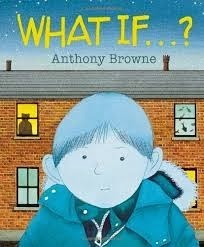
Any parents (and that's surely every parent) who's fielded a barrage of '...but what ifs?' from children about to embark on some new experience however ordinary or run-of-the-mill will know that the childish capacity for imagining the worst is only exceeded by their relentlessly Aristotelian questioning of parental reassurances. Anthony Browne's book will certainly be a useful addition to the armoury of rebuttals and reassurances that parents sometimes find difficult to come up with. At least I do.
When it Snows by debut author Richard Collingridge isn't overtly designed to do anything other than delight children (and reading parents) with a tale full of festive magic and one with a clever twist. When everything grinds to a halt because of the snow, one small boy and his teddy bear refuse to let the weather spoil their fun and embark on a magical journey involving polar bears, snowmen, elves, reindeer and - of course - Father Christmas himself.
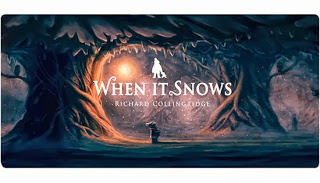
Finally, a remarkable book by Lt. Col. Chris MacGregor. Yes, that's 'Lieutenant Colonel' as in a serving British Army officer, in this case with the King's Royal Hussars. (Hussah!)
As almost all forces parents (but also innumerable truck-drivers, doctors, actors, businessmen/women and sportsmen and women) must know only too well, some jobs necessarily involve leaving home, sometimes for long periods of time. MacGregor began writing the book in 2007 when he returned from an emotional tour of Iraq. Having commanded over 100 soldiers who between them left over 50 children behind, MacGregor realised the importance of preparing families for the extended absence of one or other parent as well as the beneficial effect of saying proper goodbyes.
My Daddy's Going Away includes a foreword by HRH The Prince of Wales and proceeds from the sale of the book are helping to support the work of the veteran's mental health charity Combat Stress.
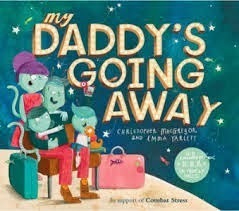

Any parents (and that's surely every parent) who's fielded a barrage of '...but what ifs?' from children about to embark on some new experience however ordinary or run-of-the-mill will know that the childish capacity for imagining the worst is only exceeded by their relentlessly Aristotelian questioning of parental reassurances. Anthony Browne's book will certainly be a useful addition to the armoury of rebuttals and reassurances that parents sometimes find difficult to come up with. At least I do.
When it Snows by debut author Richard Collingridge isn't overtly designed to do anything other than delight children (and reading parents) with a tale full of festive magic and one with a clever twist. When everything grinds to a halt because of the snow, one small boy and his teddy bear refuse to let the weather spoil their fun and embark on a magical journey involving polar bears, snowmen, elves, reindeer and - of course - Father Christmas himself.

Finally, a remarkable book by Lt. Col. Chris MacGregor. Yes, that's 'Lieutenant Colonel' as in a serving British Army officer, in this case with the King's Royal Hussars. (Hussah!)
As almost all forces parents (but also innumerable truck-drivers, doctors, actors, businessmen/women and sportsmen and women) must know only too well, some jobs necessarily involve leaving home, sometimes for long periods of time. MacGregor began writing the book in 2007 when he returned from an emotional tour of Iraq. Having commanded over 100 soldiers who between them left over 50 children behind, MacGregor realised the importance of preparing families for the extended absence of one or other parent as well as the beneficial effect of saying proper goodbyes.
My Daddy's Going Away includes a foreword by HRH The Prince of Wales and proceeds from the sale of the book are helping to support the work of the veteran's mental health charity Combat Stress.

Published on September 26, 2013 08:47
September 24, 2013
Come, Sleep...
... and with thy sweet deceiving/Lock me in delight awhile;
So wrote John Fletcher (1579-1625). But if, like me, you suffer from regular bouts of insomnia you'll know that - far from being 'sweet' or even delightful, sleep (or the lack of it) can be a real pain.
Well, help is at hand. I have found a solution. It does not involve drugs. Nor does it involve imaginary sheep. No. It involves trains.
Allow me to explain. My bouts of nocturnal wakefulness usually occur between one or two a.m. and about four or five in the morning. It can be a sizeable time to lie in the darkness trying to get back to sleep. Of course, therein (as the Bard says) lies the rub. Because whatever you do, you should NOT try to go back to sleep. Absolutely not.
Get up, make a drink, read a book. Do anything except lie there trying to get back to sleep. But sometimes getting up can make matters worse. I invariably find something fascinating to do and forget it's actually the middle of the night and I should be doing something else. (Namely, sleeping.)
So I've taken to lying in bed and reading. Not a book, because that involves the turning of pages to say nothing of the turning of a light which might disturb whoever's sleeping next to you. But a smartphone or a tablet? Made for such a situation, surely!
Well, maybe. Although the Kindle app on my phone is a godsend (as are Twitter, Facebook and Instagram in the wee small hours of the morning) the light from that small screen can actually trigger sleeplessness, resulting as it does in a reduction in melatonin.
So what to do? A milky drink is good (containing, as it does, a sleep-inducing chemical called triptofan) but you have to get up to make that (see above). And the 'phone or tablet screen is bad, but only if you look at it for too long. And that's the problem. Reading an interesting book (or some gripping blog posts) keeps me glued to the little rectangle for longer than is good for me. I need something silent on the phone or iPad that lulls me gently back to the land of nod.
And, last night, I found it. It's this. I couldn't not share it. It's wonderful. Don't ask me how I found it as I'm not sure I know myself. But it's one of a whole series of railway journeys from the driver's perspective on European railways. The scenery alone make the films worth watching. But there's something hypnotic about the regular passing of the sleepers and the intermittent stopping at the stations that makes this so eye-droppingly wonderful that I couldn't not share it with you today.
And if, like me, you'd like to join the aforementioned Mr Fletcher and,
Let some pleasing dreams beguile
All my fancies; that from thence
I may feel an influence
All my powers of care bereaving!
Then, give this a go. I've yet to see the entire journey. Because I reach my desired destination about about five minutes travelling.
Sweet dreams
So wrote John Fletcher (1579-1625). But if, like me, you suffer from regular bouts of insomnia you'll know that - far from being 'sweet' or even delightful, sleep (or the lack of it) can be a real pain.
Well, help is at hand. I have found a solution. It does not involve drugs. Nor does it involve imaginary sheep. No. It involves trains.
Allow me to explain. My bouts of nocturnal wakefulness usually occur between one or two a.m. and about four or five in the morning. It can be a sizeable time to lie in the darkness trying to get back to sleep. Of course, therein (as the Bard says) lies the rub. Because whatever you do, you should NOT try to go back to sleep. Absolutely not.
Get up, make a drink, read a book. Do anything except lie there trying to get back to sleep. But sometimes getting up can make matters worse. I invariably find something fascinating to do and forget it's actually the middle of the night and I should be doing something else. (Namely, sleeping.)
So I've taken to lying in bed and reading. Not a book, because that involves the turning of pages to say nothing of the turning of a light which might disturb whoever's sleeping next to you. But a smartphone or a tablet? Made for such a situation, surely!
Well, maybe. Although the Kindle app on my phone is a godsend (as are Twitter, Facebook and Instagram in the wee small hours of the morning) the light from that small screen can actually trigger sleeplessness, resulting as it does in a reduction in melatonin.
So what to do? A milky drink is good (containing, as it does, a sleep-inducing chemical called triptofan) but you have to get up to make that (see above). And the 'phone or tablet screen is bad, but only if you look at it for too long. And that's the problem. Reading an interesting book (or some gripping blog posts) keeps me glued to the little rectangle for longer than is good for me. I need something silent on the phone or iPad that lulls me gently back to the land of nod.
And, last night, I found it. It's this. I couldn't not share it. It's wonderful. Don't ask me how I found it as I'm not sure I know myself. But it's one of a whole series of railway journeys from the driver's perspective on European railways. The scenery alone make the films worth watching. But there's something hypnotic about the regular passing of the sleepers and the intermittent stopping at the stations that makes this so eye-droppingly wonderful that I couldn't not share it with you today.
And if, like me, you'd like to join the aforementioned Mr Fletcher and,
Let some pleasing dreams beguile
All my fancies; that from thence
I may feel an influence
All my powers of care bereaving!
Then, give this a go. I've yet to see the entire journey. Because I reach my desired destination about about five minutes travelling.
Sweet dreams
Published on September 24, 2013 05:26
September 19, 2013
Dads need balls
...Obviously.
Just not, perhaps, as large as those who don't take such an active role in bringing up their children.
Here's a story you might have missed last week, but one I can't let pass without comment. As US (where else?) study suggests that the size of a man's testicles may indicate his aptitude for childcare. Tell us something we don't already know, I scoffed as I read the headline.
And it did. Because the correlation (correlation, people - not cause/effect) between lunchbox size and the likelihood of being a hands-on dad isn't what you think. Or certainly wasn't what I thought.
Far from showing that we active fathers are more generously endowed than the rest of the male population (and why wouldn't we be, so clearly comfortable in our own skin?) the rather hairy fact of the matter is this: men with larger testes are less likely to bath their kids, get up to comfort them, cook their meals or generally do any of the 'hands-on' parenting tasks. Which means those of us who do...
Like I said, if you're secure in who you are and comfortable in your own skin, such things shouldn't matter. So why am I just a tiny respectable-enough-but-not-baboon-sized bit bothered?
Face? Bovvered? Yes it is. And it's not the size per se that matters. No, really it isn't. (It's what you do with it anyway, as everybody knows.)
No. What bothers me is the evolutionary explanation that's been given for this otherwise inexplicable correlation. (Correlation, folks. Nappy-changing doesn't shrink 'em, right?) Because the same scientists who discovered this disturbing fact (how they discovered it I'll leave to your imagination; why they wanted to discover it remains a mystery) have postulated this as a possible explanation, which I have taken the liberty of re-writing:
Big balls men don't need to care for their kids because they've got big balls and big balls are going to get them plenty of bedroom action.
And the unavoidable implication of that conclusion is that the rest of us have to look after what we've made and why the hell wouldn't we be getting up in the night to comfort a crying child because, hey, there's not a lot else else happening, is there?
Well, that might be true. Every parent knows how knackering young children can be. Actually, an awful thought has just occurred to me. We all know that correlation street isn't the same as cause and effect. One of the academics who was wheeled out to comment on the findings stressed, 'It is important to recognise that these data are only correlatory, and no cause and effect are demonstrated.'
But you know what?
That's a load of bollocks.
I'll tell you why hands-on dads have smaller... you-know-whats. It's nature's handy way of protecting them.
There can't be many dads who haven't felt the excruciating pain that a collision with a small child can cause. It can't be good for our abilities, can it? So Mother Nature - recognising our true worth as genuine co-parents - has devised this as a means of protecting our 'vital assets' for future use.
The same thing happens when you go swimming in the sea. (So I'm told.) The bigger they are, the harder they fall as the saying goes. Or in this case, the more vulnerable they are. And the more painful they will be.
No wonder big balls won't go near his kids.
He's scared!
Just not, perhaps, as large as those who don't take such an active role in bringing up their children.
Here's a story you might have missed last week, but one I can't let pass without comment. As US (where else?) study suggests that the size of a man's testicles may indicate his aptitude for childcare. Tell us something we don't already know, I scoffed as I read the headline.
And it did. Because the correlation (correlation, people - not cause/effect) between lunchbox size and the likelihood of being a hands-on dad isn't what you think. Or certainly wasn't what I thought.
Far from showing that we active fathers are more generously endowed than the rest of the male population (and why wouldn't we be, so clearly comfortable in our own skin?) the rather hairy fact of the matter is this: men with larger testes are less likely to bath their kids, get up to comfort them, cook their meals or generally do any of the 'hands-on' parenting tasks. Which means those of us who do...
Like I said, if you're secure in who you are and comfortable in your own skin, such things shouldn't matter. So why am I just a tiny respectable-enough-but-not-baboon-sized bit bothered?
Face? Bovvered? Yes it is. And it's not the size per se that matters. No, really it isn't. (It's what you do with it anyway, as everybody knows.)
No. What bothers me is the evolutionary explanation that's been given for this otherwise inexplicable correlation. (Correlation, folks. Nappy-changing doesn't shrink 'em, right?) Because the same scientists who discovered this disturbing fact (how they discovered it I'll leave to your imagination; why they wanted to discover it remains a mystery) have postulated this as a possible explanation, which I have taken the liberty of re-writing:
Big balls men don't need to care for their kids because they've got big balls and big balls are going to get them plenty of bedroom action.
And the unavoidable implication of that conclusion is that the rest of us have to look after what we've made and why the hell wouldn't we be getting up in the night to comfort a crying child because, hey, there's not a lot else else happening, is there?
Well, that might be true. Every parent knows how knackering young children can be. Actually, an awful thought has just occurred to me. We all know that correlation street isn't the same as cause and effect. One of the academics who was wheeled out to comment on the findings stressed, 'It is important to recognise that these data are only correlatory, and no cause and effect are demonstrated.'
But you know what?
That's a load of bollocks.
I'll tell you why hands-on dads have smaller... you-know-whats. It's nature's handy way of protecting them.
There can't be many dads who haven't felt the excruciating pain that a collision with a small child can cause. It can't be good for our abilities, can it? So Mother Nature - recognising our true worth as genuine co-parents - has devised this as a means of protecting our 'vital assets' for future use.
The same thing happens when you go swimming in the sea. (So I'm told.) The bigger they are, the harder they fall as the saying goes. Or in this case, the more vulnerable they are. And the more painful they will be.
No wonder big balls won't go near his kids.
He's scared!
Published on September 19, 2013 02:48
September 15, 2013
Sunday Supplement
We apologise for the delayed arrival of today's Bringing up Charlie review round-up. This is due to unforeseen consequences of a splendid evening entertaining friends (eating, drinking and generally merry-making) until the wee small hours and the subsequent loss of normal service to the editor of this rubbish, i.e. me. In other words, I was hung over. Rather badly.
But I'm better now and just in time to tell you about some fantastic products I've been asked to feature, starting with something every household needs after a dinner party - a steam mop. Not that our guests were messy, you understand. But, well... a day of cooking followed by an evening's entertaining and increasing inebriation inevitably leads to the odd spill. Which is where the new Hard Floor Advance+ steam mop from Vax comes in handy. It heats up in seconds and leaves floors so sparkling clean and fresh you’ll never want to use a conventional mop again. Not that I ever did.
Seriously, mopping floors is just, well... so tedious. The nearest I ever get (or should I say, the nearest I ever got) was attaching a couple of old dishcloths to my slippers and sliding about on the tiles. (It was either that or getting down on my hands an knees.) But now, with my new Hard Floor Advance+ (which combines the triple cleaning action of hot steam, citrus-fresh detergent and a compact scrub brush head to tackle stubborn spots and stains) I'm a new man. And our kitchen has a new floor. Or at least, a new colour now we can see the tiles.

The Vax S3S+ Hard Floor Advance+ is available from all major retailers and direct from Vax.co.uk at RRP £99.99. Old dishcloths for attachment to feet thereof are available from me, free.
Next, car seats. I can't think of a way of segueing from steam mops to the child car seats so I'm not going to. But a new Group 2/3 seat from Britax called the KIDFIX XP SICT certainly takes safety to a whole new level. Designed for children aged 4-12 years it boasts a fantastic new cushioned seat belt pad which reduces high neck loads by 30% and takes crash forces away from the chest area. It also protects a child in the event of a side impact collision with adjustable side impact cushion technology (SICT). Once children reach an age when they can safely and legally use a booster or some other kind of seat which utilises the car's own safety harness there's a danger of assuming they're as protected as they need to be. This new seat ups the ante considerably. It's out now and retails at £165.
Finally, what do you do when the weather outside is frightful and you're still some way off fully recovering from the night before and the kids are about the start climbing the walls? Well, a couple of new products from LeapFrog have kept my two entertained - and educated - this weekend and they're well worth a mention.
Charlie's a long-established fan of LeapFrog. His LeapPad goes with him everywhere and (see this post) certainly made long car journeys bearable this summer. Now he's been sent a wonderful new Tag Reader to play with. I say 'play' but, in fact, the Tag Reader is an entire educational phenomenon encouraging reading, writing and learning on a whole host of levels. Charlie loves it.
Eloise is rather young for it, though. But not to be left out the lovely LeapFrog team has sent her a wonderful cyber pet (I can think of no other more apt description) which not only provides her with something to cuddle up to, but something which sings songs to her, reads her stories and starts some basic word recognition with her, too.
Thanks, LeapFrog. You very nearly saved my life.
But I'm better now and just in time to tell you about some fantastic products I've been asked to feature, starting with something every household needs after a dinner party - a steam mop. Not that our guests were messy, you understand. But, well... a day of cooking followed by an evening's entertaining and increasing inebriation inevitably leads to the odd spill. Which is where the new Hard Floor Advance+ steam mop from Vax comes in handy. It heats up in seconds and leaves floors so sparkling clean and fresh you’ll never want to use a conventional mop again. Not that I ever did.
Seriously, mopping floors is just, well... so tedious. The nearest I ever get (or should I say, the nearest I ever got) was attaching a couple of old dishcloths to my slippers and sliding about on the tiles. (It was either that or getting down on my hands an knees.) But now, with my new Hard Floor Advance+ (which combines the triple cleaning action of hot steam, citrus-fresh detergent and a compact scrub brush head to tackle stubborn spots and stains) I'm a new man. And our kitchen has a new floor. Or at least, a new colour now we can see the tiles.

The Vax S3S+ Hard Floor Advance+ is available from all major retailers and direct from Vax.co.uk at RRP £99.99. Old dishcloths for attachment to feet thereof are available from me, free.
Next, car seats. I can't think of a way of segueing from steam mops to the child car seats so I'm not going to. But a new Group 2/3 seat from Britax called the KIDFIX XP SICT certainly takes safety to a whole new level. Designed for children aged 4-12 years it boasts a fantastic new cushioned seat belt pad which reduces high neck loads by 30% and takes crash forces away from the chest area. It also protects a child in the event of a side impact collision with adjustable side impact cushion technology (SICT). Once children reach an age when they can safely and legally use a booster or some other kind of seat which utilises the car's own safety harness there's a danger of assuming they're as protected as they need to be. This new seat ups the ante considerably. It's out now and retails at £165.
Finally, what do you do when the weather outside is frightful and you're still some way off fully recovering from the night before and the kids are about the start climbing the walls? Well, a couple of new products from LeapFrog have kept my two entertained - and educated - this weekend and they're well worth a mention.
Charlie's a long-established fan of LeapFrog. His LeapPad goes with him everywhere and (see this post) certainly made long car journeys bearable this summer. Now he's been sent a wonderful new Tag Reader to play with. I say 'play' but, in fact, the Tag Reader is an entire educational phenomenon encouraging reading, writing and learning on a whole host of levels. Charlie loves it.
Eloise is rather young for it, though. But not to be left out the lovely LeapFrog team has sent her a wonderful cyber pet (I can think of no other more apt description) which not only provides her with something to cuddle up to, but something which sings songs to her, reads her stories and starts some basic word recognition with her, too.
Thanks, LeapFrog. You very nearly saved my life.
Published on September 15, 2013 13:10
September 12, 2013
Too much, too soon?
That's the title of a report, published today, by the
Save Childhood Movement
. Calling for greater emphasis on play in the early years of education, the authors claim the UK would do better to follow successful Scandinavian models of education and start formal schooling at the age of six or seven.
As a parent with a child just a year into his formal schooling, and another having just this autumn started pre-school, I'm very interested in this. I'm sure the head teacher at my son's school is, too. Because reception learning was nothing if not a very skilful blend of play and learning in a lightly structured (but purposeful) environment.
What is astonishing about this report isn't the recommendations (they're pretty much agreed among experts) or the knee-jerk response of the government (negative, needless to say). What is surprising is the tone of the response from the Education Department. Although claiming to have been written by one of Mr Gove's 'spokesmen' I wonder if the language reveals the authentic voice of Mr Gove himself? It's certainly worth quoting at length. Of the report's authors it states...
"These people represent the powerful and badly misguided lobby who are responsible for the devaluation of exams and the culture of low expectations in state schools.
And on the subject of what Britain's schools need, the statement claims that...
"We need a system that aims to prepare pupils to solve hard problems in calculus or be a poet or engineer - a system freed from the grip of those who bleat bogus pop-psychology about 'self image', which is an excuse for not teaching poor children how to add up."
No one can deny that we still haven't got education 'right' in this country. There has been a culture of low expectation in state schools and our children come woefully low-down international league tables. But the fact is (fact, Mr Gove - you like those) that over ninety percent of what we now know about the brain and how children learn has only been discovered in the last twenty years. That's a frighteningly short length of time; clearly too short for many to fully understand and implement the findings.
Some countries manage, though. Others have by happy chance already utilised techniques that are in accord with the latest research. And among those are countries with some of the most successful education systems in the world; countries with consistently high scores for childhood happiness and well-being. Scandinavian countries. Finland, in particular.
And that's a fact Mr Gove.
Go to the bottom of the class.
As a parent with a child just a year into his formal schooling, and another having just this autumn started pre-school, I'm very interested in this. I'm sure the head teacher at my son's school is, too. Because reception learning was nothing if not a very skilful blend of play and learning in a lightly structured (but purposeful) environment.
What is astonishing about this report isn't the recommendations (they're pretty much agreed among experts) or the knee-jerk response of the government (negative, needless to say). What is surprising is the tone of the response from the Education Department. Although claiming to have been written by one of Mr Gove's 'spokesmen' I wonder if the language reveals the authentic voice of Mr Gove himself? It's certainly worth quoting at length. Of the report's authors it states...
"These people represent the powerful and badly misguided lobby who are responsible for the devaluation of exams and the culture of low expectations in state schools.
And on the subject of what Britain's schools need, the statement claims that...
"We need a system that aims to prepare pupils to solve hard problems in calculus or be a poet or engineer - a system freed from the grip of those who bleat bogus pop-psychology about 'self image', which is an excuse for not teaching poor children how to add up."
No one can deny that we still haven't got education 'right' in this country. There has been a culture of low expectation in state schools and our children come woefully low-down international league tables. But the fact is (fact, Mr Gove - you like those) that over ninety percent of what we now know about the brain and how children learn has only been discovered in the last twenty years. That's a frighteningly short length of time; clearly too short for many to fully understand and implement the findings.
Some countries manage, though. Others have by happy chance already utilised techniques that are in accord with the latest research. And among those are countries with some of the most successful education systems in the world; countries with consistently high scores for childhood happiness and well-being. Scandinavian countries. Finland, in particular.
And that's a fact Mr Gove.
Go to the bottom of the class.
Published on September 12, 2013 00:23
September 9, 2013
Woman's Hour
Appropriate, really don't you think? And very exciting. You see, I've listened (and enjoyed) Woman's Hour for years, since the days when it was broadcast in the afternoon, despite not being a woman (at least, not the last time I looked).
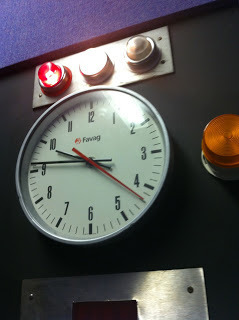
Counting down to ten o'clock
So when someone from the aforementioned programme first tweeted, then 'phoned I resisted the temptation to tell them I'd say anything (almost anything) to get on air and contained my excitement for just long enough to take in that they wanted someone to do a bit f pontificating about parent blogging. I'm good at that sort of thing.
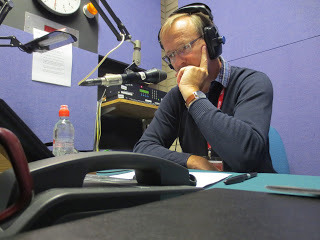
Waiting for the green light
So, with visions of striding confidently past the commissionaire and reporting to reception at Broadcasting House (I'm here for Woman's Hour, don't ya know!) I agreed to appear on this morning's programme. As it happened, I didn't get within a hundred miles of the hallowed portals of BH (one day, maybe) and was instead installed in something resembling a rather chilly broom cupboard in Lincoln. Still, I was 'on' Woman's Hour. And with the delightful Alice Harold too.
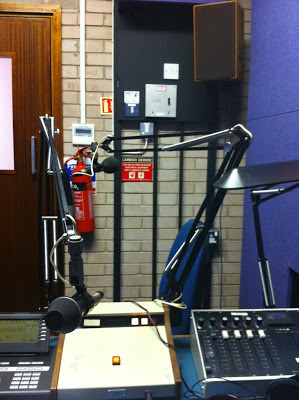
The broom cupboard
Here's what you missed if you were otherwise engaged at ten o'clock this morning. (Or, indeed, if you were fleeing from your transistor radio in response to my increasingly hysterical tweets...) Click here to listen on BBC iPlayer.
And here's what you might have seen had you been there, which you wouldn't have because the 'studio' was too small.
And anyway, it was radio so you can't.
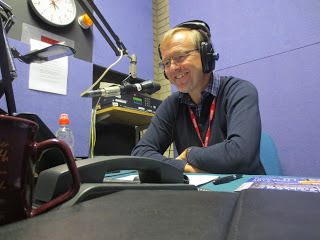
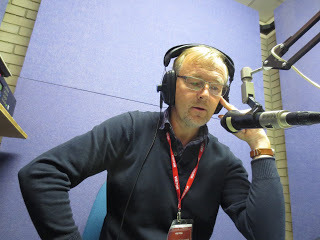
Which is a good job really, in my case. Don't have nightmares!

Counting down to ten o'clock
So when someone from the aforementioned programme first tweeted, then 'phoned I resisted the temptation to tell them I'd say anything (almost anything) to get on air and contained my excitement for just long enough to take in that they wanted someone to do a bit f pontificating about parent blogging. I'm good at that sort of thing.

Waiting for the green light
So, with visions of striding confidently past the commissionaire and reporting to reception at Broadcasting House (I'm here for Woman's Hour, don't ya know!) I agreed to appear on this morning's programme. As it happened, I didn't get within a hundred miles of the hallowed portals of BH (one day, maybe) and was instead installed in something resembling a rather chilly broom cupboard in Lincoln. Still, I was 'on' Woman's Hour. And with the delightful Alice Harold too.

The broom cupboard
Here's what you missed if you were otherwise engaged at ten o'clock this morning. (Or, indeed, if you were fleeing from your transistor radio in response to my increasingly hysterical tweets...) Click here to listen on BBC iPlayer.
And here's what you might have seen had you been there, which you wouldn't have because the 'studio' was too small.
And anyway, it was radio so you can't.


Which is a good job really, in my case. Don't have nightmares!
Published on September 09, 2013 08:20
September 5, 2013
Vive la France!
It's back-to-school week in our house and with it, the inevitable damp, drizzly and depressing realisation that those magical weeks can't last forever. The holidays are over.
And having spent a rather wonderful fortnight across La Manche in la belle France this summer it's dawned on me for the first time (and this comes as something of a shock) that I think I actually prefer life across the channel. Quelle horreur!
To understand this volte face it's important that I first confess my former chauvinistic little Englander mentality. Mon Dieu! At school I positively hated French and thought le Professuer a frightful traitor for having posters of France all over his classroom walls and for seeming to be more in love with life across the channel than here. 'If France is so good and French so wonderful, why doesn't he go and live there' I'd murmur as I struggled to conjugate verbs with infuriating gender differences. (I still fail to see how 'things' - la brioche, le pain - can be either feminine or masculine, but never mind.)
Now - Sacre Bleu! - I find myself missing the place myself and wishing I were back. And it's more than the usual réentrée blues. Everywhere I look I see another reason to prefer being there to being here.
The roads, for a start. Despite driving up the Champs-Élysées and round and round the Arc de Triomphe (there ought to be a badge you can put in your windscreen or a medal or something!) I remain firmly convinced that driving in France is a far, far more pleasurable experience than driving over here. The roads are wider, the sweep of the curves is cleaner and the road markings - white lines especially - are brighter. Ok, you have to pay for the privilege of driving on the best of them but - by and large - they're a lot emptier than our roads and worth the money.
I shouldn't mention food because I'm not sure that's fair. When I first began to visit France I was impressed by the wide cross-section of society (from families to artisans in overalls) taking their customary two-hour lunch at the local Relais or Auberge. Now, McDonald's seems as popular in France as it it here, although you can order a beer with your Big Mac over there.
But perhaps the biggest thing of all, the greatest difference and the pièce de résistance of my emerging Francophilia is this... the French attitude to, well, everything. To return to driving, before setting out this summer I had to purchase a pack of breathalysers because - if you're stopped in France - the Gendarmerie expects you - the driver - to breathalyse yourself. Brilliant! At first I thought it was yet another ruse to annoy the UK holiday drivers. (I know Francois, wee weeell get zem all to buy zeir own breathalysers... c'est magnifique!)
But on reflection it's just one symptom of a general attitude that seems to prevail throughout France which is that it's our responsibility to take precautions, get organised, keep our kids safe and get on with life - not the State's to nanny and nag or bully us into doing so. Just look at French traveuax. Their road works don't consist of miles and miles of shabby signs and a thousand traffic cones and (if you're lucky) a man picking litter on the grass verge or something. No, in France there's usually a single orange van, a couple of cones and a man or woman casually wandering about doing whatever needs doing and keeping disruption and fuss to a minimum.
I know they sign up with zeal to every new EU regulation going, but they don't seem that bothered about enforcing them all, do they? We, on the other hand, grumble about each one. sign up grudgingly and then spend a fortune appointing whole armies of jobsworths to make sure we're all doing what we're told.
And finally, what better welcome could there be when we stopped at our first French supermarché having arrived at our destination after two days of travelling?
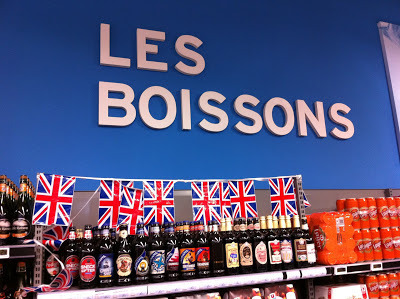
Who says the French aren't welcoming? Who says they don't like the British?
Down ze 'atch, as they ought to say. Santé or cul sec as they do say. And Vive la France!
And having spent a rather wonderful fortnight across La Manche in la belle France this summer it's dawned on me for the first time (and this comes as something of a shock) that I think I actually prefer life across the channel. Quelle horreur!
To understand this volte face it's important that I first confess my former chauvinistic little Englander mentality. Mon Dieu! At school I positively hated French and thought le Professuer a frightful traitor for having posters of France all over his classroom walls and for seeming to be more in love with life across the channel than here. 'If France is so good and French so wonderful, why doesn't he go and live there' I'd murmur as I struggled to conjugate verbs with infuriating gender differences. (I still fail to see how 'things' - la brioche, le pain - can be either feminine or masculine, but never mind.)
Now - Sacre Bleu! - I find myself missing the place myself and wishing I were back. And it's more than the usual réentrée blues. Everywhere I look I see another reason to prefer being there to being here.
The roads, for a start. Despite driving up the Champs-Élysées and round and round the Arc de Triomphe (there ought to be a badge you can put in your windscreen or a medal or something!) I remain firmly convinced that driving in France is a far, far more pleasurable experience than driving over here. The roads are wider, the sweep of the curves is cleaner and the road markings - white lines especially - are brighter. Ok, you have to pay for the privilege of driving on the best of them but - by and large - they're a lot emptier than our roads and worth the money.
I shouldn't mention food because I'm not sure that's fair. When I first began to visit France I was impressed by the wide cross-section of society (from families to artisans in overalls) taking their customary two-hour lunch at the local Relais or Auberge. Now, McDonald's seems as popular in France as it it here, although you can order a beer with your Big Mac over there.
But perhaps the biggest thing of all, the greatest difference and the pièce de résistance of my emerging Francophilia is this... the French attitude to, well, everything. To return to driving, before setting out this summer I had to purchase a pack of breathalysers because - if you're stopped in France - the Gendarmerie expects you - the driver - to breathalyse yourself. Brilliant! At first I thought it was yet another ruse to annoy the UK holiday drivers. (I know Francois, wee weeell get zem all to buy zeir own breathalysers... c'est magnifique!)
But on reflection it's just one symptom of a general attitude that seems to prevail throughout France which is that it's our responsibility to take precautions, get organised, keep our kids safe and get on with life - not the State's to nanny and nag or bully us into doing so. Just look at French traveuax. Their road works don't consist of miles and miles of shabby signs and a thousand traffic cones and (if you're lucky) a man picking litter on the grass verge or something. No, in France there's usually a single orange van, a couple of cones and a man or woman casually wandering about doing whatever needs doing and keeping disruption and fuss to a minimum.
I know they sign up with zeal to every new EU regulation going, but they don't seem that bothered about enforcing them all, do they? We, on the other hand, grumble about each one. sign up grudgingly and then spend a fortune appointing whole armies of jobsworths to make sure we're all doing what we're told.
And finally, what better welcome could there be when we stopped at our first French supermarché having arrived at our destination after two days of travelling?

Who says the French aren't welcoming? Who says they don't like the British?
Down ze 'atch, as they ought to say. Santé or cul sec as they do say. And Vive la France!
Published on September 05, 2013 02:56
August 30, 2013
Seamus Heaney 1939-2013
I hope I'll not be accused of band-wagon jumping, but as an ardent admirer of 20th century English verse I can't let the passing today of Nobel Laureate Seamus Heaney go unmarked. The more so as he was so archetypically Northern Irish. And that, for me, has been something of a problem.
I've nothing against the Northern Irish. Some of my best friends are or have been from 'the province' and I've spent many happy hours drinking in Belfast bars, sampling Bushmills at the famous distinllery after stamping on the nearby Giant's Causeway or spending summers rowing on Lough Erne with my friend 'Seamus' (not his real name!) from Enniskillen.
In my personal experience Northern Irish people are the most welcoming, friendly, open, honest and entertaining people on the planet. But there's still something about a Norn Iron accent (especially on the BBC which seems to have a fetish for employing huge numbers of correspondents with an unmistakable Ulster twang) that makes my stomach lurch. I can only put it down to the dark days of the troubles, a father who worked away in Wakefield during the height of the IRA mainland bombing campaigns (which included frequent car-bombings in that city thanks to there being several provisional IRA prisoners in the maximum security prison there) and - later - my own interrupted schooldays when, thanks to a succession of scares, we would troop out of school to line up on Thornes Road for hours while the buildings were thoroughly searched for (thankfully) non-existent bombs.
Years laters, as a teacher myself, I was faced on a Monday morning by traumatised students who had been shopping in Warrington on the fateful Saturday when an all-too-real Irish bomb killed Tim Parry and Jonathan Ball.
There's something primitive and irrational about it, but no matter whom the BBC employed to read the words of Gerry Adams and Martin McGuiness during the ridiculous ban on direct broadcasting and no matter how many wonderfully warm words I've heard from genuine Irish friends that accent, the knee-capped vowels and choking consonants, have never really seemed to me to be poetry.
Until I discovered Seamus Heaney. For Heaney didn't just use the written word, the content of sublime Irish poetry or the rhythm of Celtic-inspired English metre to communicate. He used his voice, his own Northern Irish voice. And with it, a gentler, soothing and altogether calming influence on my own nerves. Not that his poetry is pretty. It deals full on with the 'troubles' of both Northern Irish history and life itself, humanity and the condition of humanity.
But the tone is soothing, calming, timeless and magically musical. His readings smooth the rough edges of an accent that had previously jagged its way into my worst nightmares. He was a one-man, linguistic peace process. His poetry is probably the greatest poetry written in English in the twentieth century.
I once almost met him. Fleeing from an overdose of art at Tate Modern one afternoon I escaped and stood by the river for a few blissful moments, during which he passed, all white hair and larger-than-life gait. 'That's Seamus Heaney' I thought and tried my hardest not to stare. The hordes on the Thames embankment hadn't noticed or - if they had - were less impressed, less star-struck than I was. I watched as he walked passed, yards from where I was leaning against the railings and recovering from a surfeit of Chagall and Mondrian. Maybe I looked as if I'd overdosed on modern art, I don't know. But as the great man walked by, I caught his eye (or he caught mine) and he smiled - the most wonderfully clichéd Irish twinkle in his eye.
And I looked out across old Father Thames and I smiled too...
I've nothing against the Northern Irish. Some of my best friends are or have been from 'the province' and I've spent many happy hours drinking in Belfast bars, sampling Bushmills at the famous distinllery after stamping on the nearby Giant's Causeway or spending summers rowing on Lough Erne with my friend 'Seamus' (not his real name!) from Enniskillen.
In my personal experience Northern Irish people are the most welcoming, friendly, open, honest and entertaining people on the planet. But there's still something about a Norn Iron accent (especially on the BBC which seems to have a fetish for employing huge numbers of correspondents with an unmistakable Ulster twang) that makes my stomach lurch. I can only put it down to the dark days of the troubles, a father who worked away in Wakefield during the height of the IRA mainland bombing campaigns (which included frequent car-bombings in that city thanks to there being several provisional IRA prisoners in the maximum security prison there) and - later - my own interrupted schooldays when, thanks to a succession of scares, we would troop out of school to line up on Thornes Road for hours while the buildings were thoroughly searched for (thankfully) non-existent bombs.
Years laters, as a teacher myself, I was faced on a Monday morning by traumatised students who had been shopping in Warrington on the fateful Saturday when an all-too-real Irish bomb killed Tim Parry and Jonathan Ball.
There's something primitive and irrational about it, but no matter whom the BBC employed to read the words of Gerry Adams and Martin McGuiness during the ridiculous ban on direct broadcasting and no matter how many wonderfully warm words I've heard from genuine Irish friends that accent, the knee-capped vowels and choking consonants, have never really seemed to me to be poetry.
Until I discovered Seamus Heaney. For Heaney didn't just use the written word, the content of sublime Irish poetry or the rhythm of Celtic-inspired English metre to communicate. He used his voice, his own Northern Irish voice. And with it, a gentler, soothing and altogether calming influence on my own nerves. Not that his poetry is pretty. It deals full on with the 'troubles' of both Northern Irish history and life itself, humanity and the condition of humanity.
But the tone is soothing, calming, timeless and magically musical. His readings smooth the rough edges of an accent that had previously jagged its way into my worst nightmares. He was a one-man, linguistic peace process. His poetry is probably the greatest poetry written in English in the twentieth century.
I once almost met him. Fleeing from an overdose of art at Tate Modern one afternoon I escaped and stood by the river for a few blissful moments, during which he passed, all white hair and larger-than-life gait. 'That's Seamus Heaney' I thought and tried my hardest not to stare. The hordes on the Thames embankment hadn't noticed or - if they had - were less impressed, less star-struck than I was. I watched as he walked passed, yards from where I was leaning against the railings and recovering from a surfeit of Chagall and Mondrian. Maybe I looked as if I'd overdosed on modern art, I don't know. But as the great man walked by, I caught his eye (or he caught mine) and he smiled - the most wonderfully clichéd Irish twinkle in his eye.
And I looked out across old Father Thames and I smiled too...
Published on August 30, 2013 12:52
August 27, 2013
Win a Jack the Giant Slayer Combo Pack!
Yes, a combo pack. That includes a DVD, blue-ray and ultra-violet disc of the latest Warner Bros blockbuster release.
Unleashed on the Earth for the first time in centuries, the giants strive to reclaim the land they once lost, forcing Jack (Nicholas Hoult), into the battle of this life to stop them and rescue the princess!
The question is... are you courageous enough to rescue the princess? Are you brave like Jack? Take the quiz to find out!
And to win the combo pack, leave a 'pick me' comment below.
Good luck!
Unleashed on the Earth for the first time in centuries, the giants strive to reclaim the land they once lost, forcing Jack (Nicholas Hoult), into the battle of this life to stop them and rescue the princess!
The question is... are you courageous enough to rescue the princess? Are you brave like Jack? Take the quiz to find out!
And to win the combo pack, leave a 'pick me' comment below.
Good luck!
Published on August 27, 2013 12:22
August 22, 2013
Summer Fun with John Lewis
There might be only a couple of weeks left (unless you're in Scotland) but if you're running out of holiday activity ideas this little widget from John Lewis might just come in handy. It arrived in my inbox today and so I thought I'd better share it with everybody. Unfair to keep it to yourself, don't you think? And on that note, if you've any activity ideas you'd like to share, do please leave them in the comment box below. I'm getting desperate...
Published on August 22, 2013 02:30



